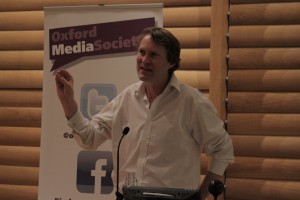“It was as if I was in a really tawdry spy film, and I had been cast as James Bond.”
That was how Luke Harding, a journalist at The Guardian, described the bizarre and harrowing circumstances he faced in Russia, during a speech to the Oxford Media Society on October 31st.
Harding first angered Russian authorities by contributing to a front-page Guardian article on former Russian oligarch Boris Berezovsky’s plans for a violent overthrow of the Russian government. The piece went viral in Russia, and Russia’s Federal Security Service (FSB) called in Harding, then the Moscow Bureau Chief, for questioning.
The FSB had already investigated his role in the article; the real purpose of the interrogation was to intimidate him.
The harassment worsened as Harding continued to write articles critical of the Russian government, including a piece suggesting that President Vladimir Putin amassed his undisclosed personal fortune through illicit business deals. In a particularly chilling encounter, Harding recounted, he returned to his flat to find the window next to his son’s bed wide open. The message was clear: be careful, or your children will pay the price.
Harding maintains that the threats were never serious, and were only meant to scare him into leaving the country. But the provocations only strengthened his determination to stay in Russia.
“It was stupid and counter-productive because not only did I write a book about this, but also it made my articles on the Russian government more critical than they otherwise would have been,” said Harding, in an interview with the Globalist.
He chronicled his five years in Russia in a book, Mafia State.
“I don’t think my experience was heroic, but it’s emblematic of what’s happening in Russia, that you have a very thuggish regime that still to a large degree lives in the Cold War, which uses these spooky KGB methods against its enemies, as if it’s 1983 and not 2012,” said Harding.
Russian authorities monitored Harding’s emails and phone calls, even bugging his bedroom with audio and video recording equipment.
His wife, Phoebe, supported his decision to stay in Russia in spite of the harassment. They found that the best coping mechanism was humour.
“We made a lot of jokes about Putin and the FSB, knowing that they were listening in. We even at one point hung up a wall clock with Putin’s face on it on the front door, so that when these agents came in, the first thing they saw was the tsar looking down at them,” Harding said.
He drew the full ire of the Russian authorities after writing an article on Wikileaks, where he exposed the cosy relationship between organised crime and government in Russia. When he returned from London after publishing the piece, he was refused entry into Russia and his visa was annulled.
“It was fantastically arrogant for a regime to do this,” he said. “I’m not a terrorist. I’m not trying to blow anyone up. I was just a journalist trying to do my job.”
As shocked as he was by the decision, Harding considered himself lucky to be a foreigner. Russian journalists deemed traitors by the state are routinely beaten, arrested on false charges, and even killed.
Harding went on to write a book about Wikileaks with Guardian investigations executive editor David Leigh. Steven Spielberg bought the rights to the book, Wikileaks: Julian Assange’s War on Secrecy, and the film, set to star Benedict Cumberbatch, is in pre-production.
Most recently, Harding has published an e-book based on his experiences travelling with rebel troops in Libya, Murder in Benghazi and the Fall of Gaddafi, with fellow Guardian journalist Martin Chulov. He believes that without NATO intervention, Libya would be where Syria is now, ravaged by a seemingly endless civil war.
For Harding, covering Libya was in many ways easier than his time in Russia.
“The curious thing is, I think war is very easy to report. If you cover Libya and Syria, your job isn’t to make ideological pronouncements, it’s simply to report what you see and what people say,” he said. “In war, people’s stories just tell themselves; it’s quite simple.”




